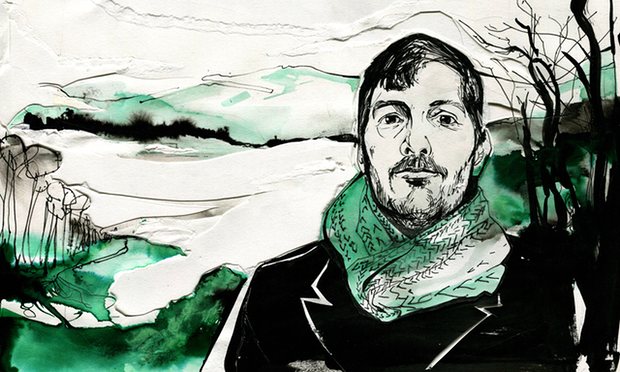
TS Eliot prize winner Jacob Polley talks to The Guardian about distractions, idleness and the art of forgetting.
When my days were all nearly all my own, I used to keep to a routine. Turn up at the page. Achieve something, a little something, before the afternoon crept in with interesting stuff on the radio, a walk in the air, that first glass of wine … I’ve written prose and poetry, and I found that a routine was essential for the prose writing. Then the writing day was, in the early stages of a novel and for a long time after the early stages, about amassing the words. The words had to be there, or there wouldn’t be anything there. That sounds like an odd thing to say now I’ve said it, but I suspect that writing a poem can be as much about the storing up of the energy before the poem’s written down as about the casting of it on to paper. One can have a strong sense of a poem being there, even when there isn’t anything there. Spooky. But this difference between prose and poetry might only be a difference in my own faiths in the two ways in which I can reliably both waste and escape time.
If I’m writing a poem, ideally I should probably be kept busy for most of the day doing anything other than writing. This helps me to forget that I’ve ever written anything, which is a necessary if bewildering condition that, for me, means I can set out across the page, as if across that fabulous snowfield of childhood. Wow! Snow! And look what it’s done to the world. I need that snow-wow. I might get lost. Too soon it might all go to dirty slush. But I could be out in the cold for ages. I could meet something totally unexpected, looming from the whiteness.
But this is poetry talk, which quickly steepens into metaphor as we try to approach the mysterious workings that might materialise a poem, workings that are not much to look at, really. I don’t have a desk, but if I’m at home I tend to take up an amateurish position at one end of the sofa or sitting up in bed, with a bucket of tea close by. I’ve been a father now for two-and-a-half years, so a writing day wouldn’t be a good one if my son hadn’t stowed my notebook of new work in a safe and undiscoverable place, or persuaded me, quite rightly, to abandon all the muttering, sitting-still-stuff for some dancing or train-track construction and destruction.
I need to set out across the page as if crossing that fabulous snowfield of childhood – I need that snow-wow
I’m basically an idler when I’m not being a father or doing my day job, which is teaching, so I have to be provoked on to the page by something I can’t find words for, or feel I can almost find words for. So a day of busyness, with an enforced but limited period of idleness in it somewhere, when a glimpse of something – someone’s face, a barbed wire fence, a frost hollow – startles me, is good. Why would such a glimpse startle me? I start to push words around to find out.
I’ve heard of writers who loathe writing, who loathe doing it, but I’m not one of these. Writing is an adventure for me. The challenges can be fiendish, tying me in knots, distracting me, forcing me again and again to take the measure of my almost immeasurable limitations, but the flurries of pure invention, when I’m on with something and hardly dare leave it alone – just in case it melts away before I’ve intuited its shape, before I’ve seen it for what it really is – are too addictive not to chase. Idly, of course.
Or so I say. All this is an act of retrospective reconstruction, or hope for a future writing day, because I finished my last book of poems, Jackself, a while ago now and I’m spending my writing days not writing. By all accounts, a day of not writing doesn’t look much different to a writing day; there’s just no writing. But there is the glorious summery recharging pleasure of reading other people’s writing. I’m still boyishly excited to browse in a public library – remember those? – and find a book by chance that will hold me as I learned as a child to be held by words on a page. Here is the strange exchange: my attention to these words for an enlargement of my capacity to attend to the world and those in it, which will return me in time to that feeling that I can almost find my own words for the world.
Illustration by Alan Vest
First published in the Guardian 22.1.17